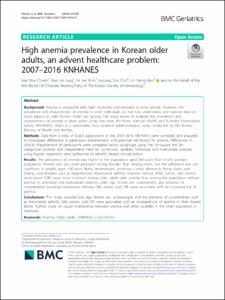High anemia prevalence in Korean older adults, an advent healthcare problem: 2007-2016 KNHANES
- Keimyung Author(s)
- Shim, Ye Jee
- Department
- Dept. of Pediatrics (소아청소년학)
- Journal Title
- BMC Geriatrics
- Issued Date
- 2020
- Volume
- 20
- Issue
- 1
- Keyword
- Anemia; Older adults; KNHANES; Comorbidity
- Abstract
- Background:
Anemia is associated with high morbidity and mortality in older people. However, the prevalence and characteristics of anemia in older individuals are not fully understood, and national data on these aspects in older Korean adults are lacking. This study aimed to evaluate the prevalence and characteristics of anemia in older adults using data from the Korea National Health and Nutrition Examination Survey (KNHANES), which is a nationwide cross-sectional epidemiological study conducted by the Korean Ministry of Health and Welfare.
Methods:
Data from a total of 62,825 participants of the 2007–2016 KNHANES were compiled and analyzed to investigate differences in participant characteristics and potential risk factors for anemia. Differences in clinical characteristics of participants were compared across subgroups using the chi-square test for categorical variables and independent t-test for continuous variables. Univariate and multivariate analyses using logistic regression were performed to identify related clinical factors.
Results:
The prevalence of anemia was higher in the population aged ≥65 years than in the younger population. Anemia was also more prevalent among females than among males, but this difference was not significant in people aged > 85 years. Being underweight, receiving a social allowance, living alone, and having comorbidities such as hypertension, rheumatoid arthritis, diabetes mellitus (DM), cancer, and chronic renal failure (CRF) were more common among older adults with anemia than among the population without anemia. In univariate and multivariate analyses, older age, female sex, underweight, and presence of comorbidities including rheumatoid arthritis, DM, cancer, and CRF were associated with an increased risk of anemia.
Conclusions:
This study revealed that age, female sex, underweight, and the presence of comorbidities such as rheumatoid arthritis, DM, cancer, and CRF were associated with an increased risk of anemia in older Korean adults. Further study on causal relationships between anemia and other variables in the older population is necessary.
- Keimyung Author(s)(Kor)
- 심예지
- Publisher
- School of Medicine (의과대학)
- Citation
- Hee Won Chueh et al. (2020). High anemia prevalence in Korean older adults, an advent healthcare problem: 2007-2016 KNHANES. BMC Geriatrics, 20(1), 509. doi: 10.1186/s12877-020-01918-9
- Type
- Article
- ISSN
- 1471-2318
- Source
- https://bmcgeriatr.biomedcentral.com/articles/10.1186/s12877-020-01918-9
- Appears in Collections:
- 1. School of Medicine (의과대학) > Dept. of Pediatrics (소아청소년학)
- 파일 목록
-
-
Download
 oak-2020-0732.pdf
기타 데이터 / 733.64 kB / Adobe PDF
oak-2020-0732.pdf
기타 데이터 / 733.64 kB / Adobe PDF
-
Items in Repository are protected by copyright, with all rights reserved, unless otherwise indicated.